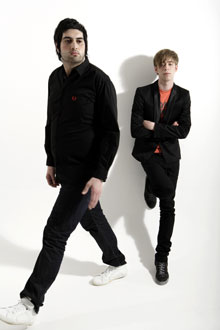
BEATS HAPPENING On Digitalism’s new I Love You, Dude, the German duo approach electronic music through traditional indie-rock songwriting. |
Obviously there aren't meaningful lines between dance, pop, and indie-rock anymore, since more and more instrument-focused acts born as rock bands are leaning on the techniques of electronic music production to modernize their sound. But sometimes that transition works the other way around too, when a traditional DJ-culture act starts to focus more on the songwriting process typical of rock bands. Take Digitalism, the German electro/house team: their 2011 single "2 Hearts," a careering, guitar-driven, post-neo-disco-punk-indie/whatever track may be the most exuberantly danceable "song" (as opposed to a "track," mind you) of the year.That little number is not an aberration of this summer's widely diverse, one-stop-genre-shopping record, I Love You, Dude (Kitsune Music), which also lays down screaming club bangers like "Reeperbahn," atmospheric Air-like daydreams like "Just Gazin'," the glitchy, chopped up beats of "Antibiotics," and the pulsing house throw-downs of "Blitz," alongside the straight-up guitar-focused dance rock of "Circles" and "Forrest Gump."
While they flirted with vocal song-oriented material on their 2007 debut Idealism, Jens Moelle, one half the duo (with Ismail Tüfekci), explains on the phone from Switzerland that some of those songs — the New Order-like (or Cut Copy doing New Order, rather) pulse of "Pogo," or the Rapture-like dirty basement dance punk of "I Want I Want" — were examples of them already moving outside their comfort zone. Songwriting, as such, he says, is something they wanted to improve upon this time around, while producing it and recording it in a more polished electronic style.
"I think the new album is song-based," Moelle explains. "We started as DJs, did instrumental tracks, and ended up writing 'Pogo' and 'I Want I Want,' full songs with a chorus and verse and everything, but I think there's more of that on the new album. After the first album, we just got into songwriting, and definitely wanted to do more of that stuff. It's less garage band, a bit more electronic, a bit more what you'd call indie, more proper songs. . . . In a way it is electronic sonically, but also more indie as well, more dance stuff. For us, it was a natural step. We've always had feet in both worlds, in a way."
They also set out to create a shift in dynamics and rhythm. On Idealism, everything revolved around the standard, clubby 130 BPMs. Not so anymore — tracks range from fast, to hard, to creepy and slow, to thrashing. "We have more disparity now, in a way. We have the spectrum, like all the songs are further apart from each other. Like when the Big Bang happened everything was really close; now there's lot of space between everything."
The duo, who've been back and forth to the States numerous times in recent years for festivals like Hard, Coachella, and Lollapalooza, have noticed a shifting tide in music here since their first visit around 2005. "People are loosening up. I think in America, when we started coming over, it was mostly electronic acts from Europe coming over and playing. Now the US and Canada have their own artists and are really proud of that. There are loads of very good, big domestic acts, and everyone is really celebrating that, which is really nice to see. People are going completely mental nowadays."